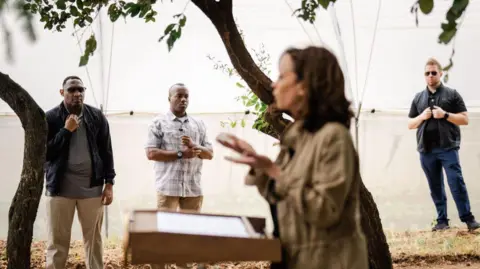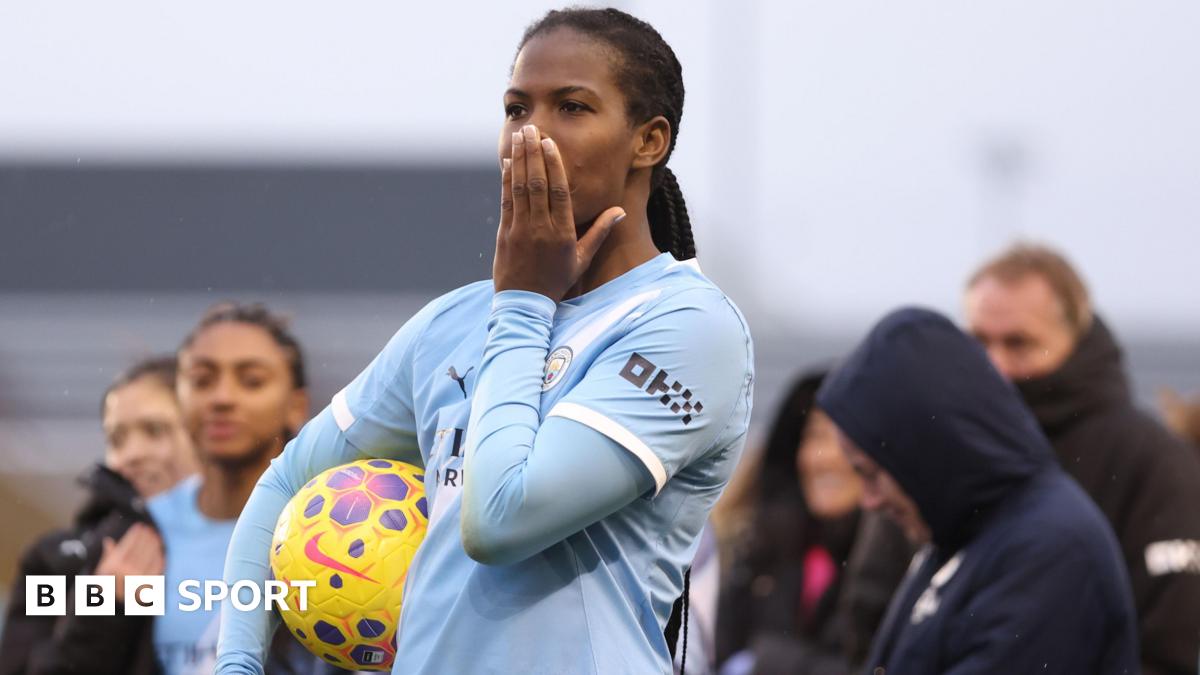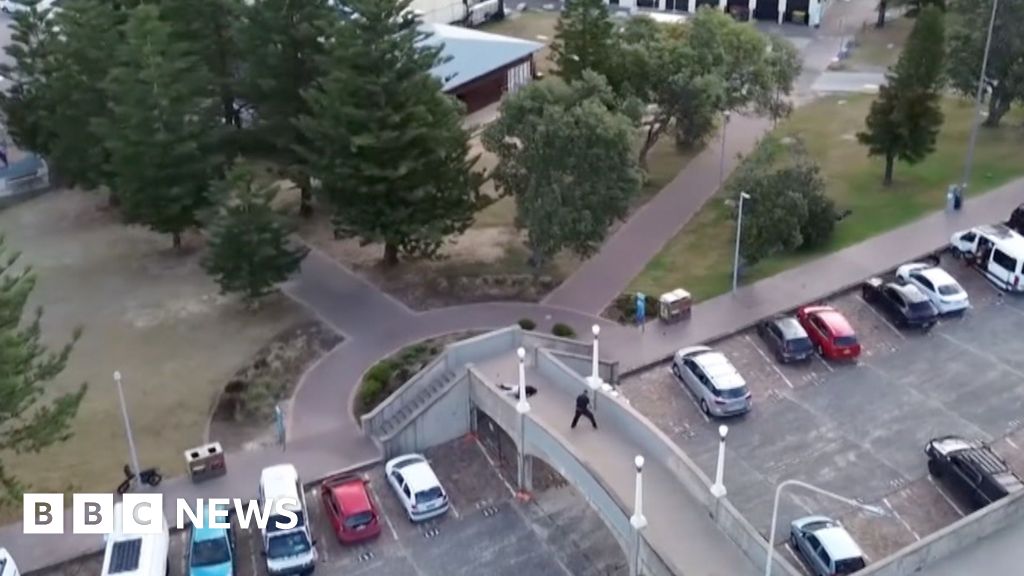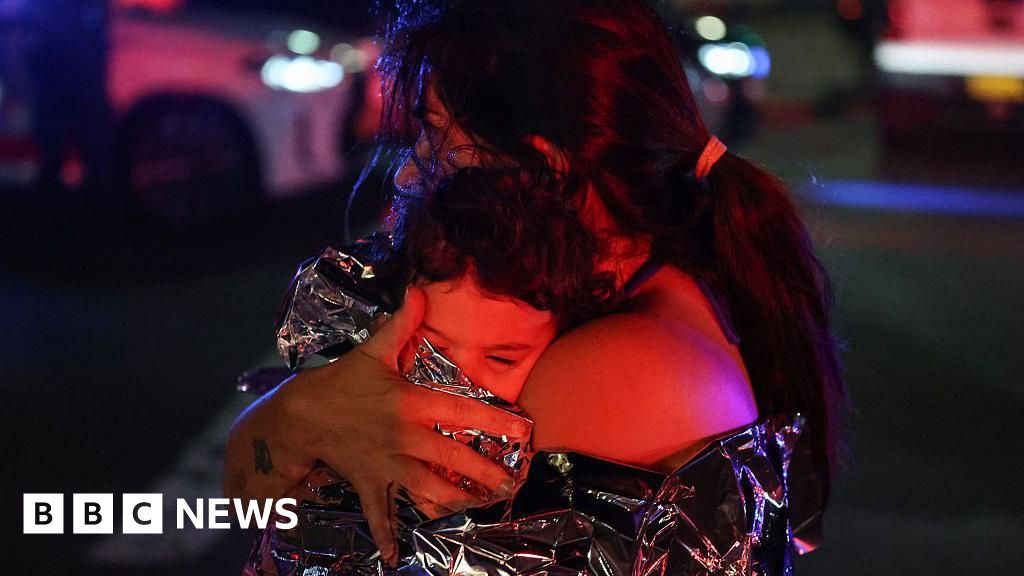Bernd Debusmann Jr, at the White House

 Getty Images
Getty Images
Unlike former presidents, vice-presidents are not guaranteed protection for the rest of their lives.
President Donald Trump has cancelled former Vice-President Kamala Harris' Secret Service detail, seven months after she left office following her unsuccessful presidential campaign.
By law, the US Secret Service provides former vice-presidents and their families six months of protection after their terms end.
That term, however, can be extended, which former President Joe Biden reportedly did before leaving office.
The move already has caused controversy, with both California Governor Gavin Newsom and Los Angeles Mayor Karen Bass calling it politically motivated.
Here's what we know.
Why did Biden extend her security?
So far, neither Biden nor Harris have commented on the reasons for extending her security past the mandated six months. CNN reported that Biden extended it for one year with a previously undisclosed directive before leaving office.
From a legal perspective, Biden was within his rights to do so.
According to a law enacted in 2008, the Secret Service can provide protection to former vice-presidents, their spouses and any children under the age of 16 after leaving office.
While the law states that the protection should not extend any more than six months, the secretary of homeland security has the authority to order "temporary protection" in situations where "information or conditions warrant such protection."
Ronald Kessler, an author with expertise on the Secret Service, told the BBC that "if you set aside political implications, it's just standard practice."
Does Harris face enhanced risks?
Sources familiar with the current situation have told CBS, the BBC's US news partner, that a recent threat assessment did not uncover anything alarming to warrant extending Harris' security arrangements.
But some in Harris' team reportedly worried that as the first woman and person of colour to serve as vice-president and as a candidate in a contentious, emotionally charged election, she faced additional threats.
A number of threats against Harris were made public during her time in office and as a presidential candidate in 2024.
Several men were arrested and charged with making online threats against her in 2024, for example, and in 2021, a Florida woman pleaded guilty to making threats against Harris and admitted she sent videos to her imprisoned husband in which she displayed firearms and said that a "hit" could be carried out within 50 days.
In March, after Harris left office, a Florida man also was arrested after allegedly threatening to kill her with a sniper rifle.
Mr Kessler, however, said that compared to other politicians Harris "hasn't stirred up that much as far as I can tell."
"I think it's a sound judgement on the part of the Secret Service," he added.
The removal of Harris' detail comes just weeks before she is scheduled to begin a multi-city tour to promote her book, 107 Days, focused on her short-lived, unsuccessful presidential bid.
According to Mr Kessler, such an operation would further stretch an already overburdened and undermanned Secret Service. In September, the agency also is responsible for international dignitaries and VIPs at the United Nations General Assembly in New York.
"That would require maybe a dozen Secret Service vehicles all over the country to follow on her big tour," he added. "That's a big drain on the service."
What elements of security are being taken away?
Secret Service protection extends far beyond the agents that drive a protectee, and protect them and their immediate family.
Additionally, the Secret Service is tasked with securing homes, such as Harris' Los Angeles residence, including installation of security systems and alarms. Agents pre-emptively identify and monitor potential threats, including those sent electronically or via social media.
It is unclear how much those protections cost, and the Secret Service has not published that figure.
Private security for well-known celebrities, VIPs and business leaders can easily reach millions of dollars per year, depending on the level of threats and protection required.
Meta, for example, reportedly paid over $23m (£17m) for Mark Zuckerberg's personal security in 2023, including $9.4m in direct security costs.
Is this political retribution from Trump?
After the removal of Harris' detail was announced, some of her allies and Trump's political detractors immediately characterised the move as politically motivated by the president.
Trump already removed Secret Service protection for former allies and foes alike, including Hunter and Ashley Biden, children of the former president; and Anthony Fauci, former director of the National Institute of Allergy and Infectious Diseases.
Several former Trump officials and allies also had their protections revoked, including ex-Secretary of State Mike Pompeo and John Bolton, a former national security adviser who had become a vocal critic.
"The safety of our public officials should never be subject to erratic, vindictive political impulses," Bob Salladay, spokesman for California Governor Gavin Newsom, told CNN.
Mr Kessler said that the "severely undermanned" Secret Service likely is refocusing its efforts on more immediate threats, such as those faced by Trump and members of his administration.
"President Trump may have been gleeful to do this," he said. "But there are real sound practical reasons".
Only one other former vice-president, Dick Cheney, is believed to have Secret Service protections extended after leaving office, by then-President Barack Obama.
Are the rules different for former presidents?
Unlike past vice-presidents, those who served as president have security for life, unless they choose not to.
In 1994 - to save costs - Congress moved to limit protection for ex-presidents and their spouses to 10 years after they left office.
But in 2013, President Obama signed a law again mandating lifetime protection. Today, this applies to George W Bush, Bill Clinton, Obama and Biden.
Only one president, Richard Nixon, is known to have chosen to forego the security offered, in 1985.
At the time, members of his staff told the New York Times he did so to save the agency money.
.png)
 3 months ago
12
3 months ago
12








 English (US) ·
English (US) ·